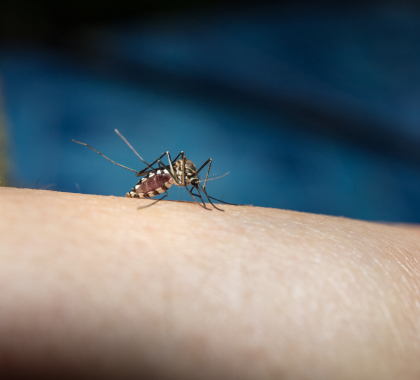Medical entomologists have taken a significant step forward in combating the spread of malaria, the highly lethal mosquito-transmitted infectious disease.
Researchers in Terni, Italy used CRISPR technology to modify reproduction-related (gene drive) genes in female Anopheles gambiae mosquitoes to render them infertile. The gene drive modification also alters the female mosquitoes’ mouth anatomy to more closely resemble a male mosquito proboscis, making them unable to pierce skin.
If the alteration proves successful, eventually almost all of the genetically modified mosquito offspring will inherit the trait. If introduced into nature, this could cause targeted mosquito populations to self-destruct.
Mosquito Population Destruction
When a group of genetically modified mosquitos was introduced into a population of unmodified mosquitoes in a small, closed laboratory at Imperial College London, the mosquito population collapsed.
Building on that success, scientists are conducting a much larger controlled experiment to observe the impact of the modified mosquitoes in an environment more closely resembling their native ecosystems.
The research team recently released the gene drive mosquitoes into a secure environment in their laboratory in Terni, Italy. Sealed behind tightly locked glass doors, a chamber in the Terni lab contains enclosures where conditions were carefully designed to mimic elements of the natural African habitat where malaria-carrying mosquitos thrive.
The scientists have released immature genetically modified mosquitoes in four of the six cages. In two cages the researchers introduced gene drive mosquitos in amounts equaling 25 percent of the unmodified populations. Two cages received gene-altered mosquitos in amounts equal to 50 percent of the existing population, and the remaining two cages will be used as a control group for comparison, receiving no modified mosquitos.
The researchers hope the mosquito populations will collapse or at least significantly decline in the next year in the four cages in which gene drive mosquitos were introduced.
If this experiment proves successful, the scientists would like to introduce the genetically modified mosquitoes in malaria-devastated areas of Africa to greatly reduce or eliminate the mosquito population.
Government Intrusion Concerns
An open letter from Target Malaria, an international nonprofit research team working with the Terni team on the mosquito project, says governments should not prevent gene drive research or prohibit the controlled introduction of gene drive mosquitos into the environment.
“Malaria cases are on the rise again after decades of progress,” said Target Malaria’s letter, which was delivered to the participants at the 14th Conference of the Parties to the United Nations Convention on Biodiversity (CBD) in 2018. “Gene drive is a well-established field of research [with] recent advances in gene editing tools hav[ing] allowed notable progress in the two years since gene drive was first discussed at CBD.
“Scientists, alongside regulatory experts, funders, and sponsors of the research, are working together to ensure research is carried out safely and responsibly, by building on previous experiences, … and putting in place monitoring and containment systems to prevent accidental releases,” Target Malaria wrote. “Ongoing discussions are also taking place to determine suitable conditions for field evaluations.”
Seeking Permission
Target Malaria’s letter asks the member states party to the CBD not to restrict gene drive research unnecessarily.
“Closing the door on research by creating arbitrary barriers, high uncertainty, and open-ended delays will significantly limit our ability to provide answers to the questions policy-makers, regulators, and the public are asking,” the letter states. “Key institutions, such as the African Union, have called for continued work in this field, emphasizing the value of the opportunity and the need for informed case-by-case assessment of this technology by national authorities.”
‘Monumental’ Potential
The potential of gene drive modifications to benefit humanity by reducing malaria cases cannot be overstated, says Dr. Henry Miller, a senior fellow at the Pacific Research Institute.
“Malaria is one of the worst of the infectious disease scourges existing today,” Miller said. “In 2016, more than 200 million cases of malaria occurred worldwide and about 445,000 people died, mostly children in sub-Saharan Africa.
“Eradication of the mosquitoes that transmit the disease would be a monumental humanitarian and public health breakthrough,” Miller said. “The meticulous, careful step-by-step approach taken by the international team that has created and is testing mosquitoes that contain a gene drive and are intended to reduce the target mosquito population is precisely the correct, responsible approach.”
Sarah Lott ([email protected]) writes from Rowlett, Texas.
Internet Info:
Austin Burt et al., “Open Letter: Research on Gene Drive Technology Can Benefit Conservation and Public Health,” Target Malaria, November 14, 2018: https://heartland.org/publications-resources/publications/open-letter-research-on-gene-drive-technology-can-benefit-conservation-and-public-health




